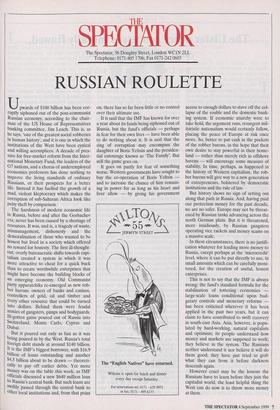The Spectator, 56 Doughty Street, London WC1N 2LL Telephone: 0171-405
1706; Fax 0171-242 0603
RUSSIAN ROULETTE
Upwards of $100 billion has been cor- ruptly siphoned out of the post-communist Russian economy, according to the chair- man of the US House of Representatives banking committee, Jim Leach. This is, as he says, 'one of the greatest social robberies in human history', and it is one in which the institutions of the West have been cynical and willing accomplices. A decade of pres- sure for free-market reform from the Inter- national Monetary Fund, the leaders of the G7 nations, and a chorus of underemployed economics professors has done nothing to improve the living standards of ordinary Russians, or their prospects for a better life. Instead it has fuelled the growth of a mad, violent kleptocracy which makes the corruption of sub-Saharan Africa look like petty theft by comparison.
. The harshness of modern economic life m Russia, before and after the Gorbachev era, never has been caused by a shortage of resources. It was, and is, a tragedy of waste, mismanagement, dishonesty and the demoralisation of those who wanted to be honest but lived in a society which offered no reward for honesty. The first ill-thought- out, overly bureaucratic shifts towards capi- talism created a system in which it was more attractive to cheat for a quick buck than to create worthwhile enterprises that might have become the building blocks of an emerging economy. Old Communist party apparatchiks re-emerged as new rob- ber barons: owners of banks and casinos, Controllers of gold, oil and timber and every other resource that could be turned into dollars. Behind them were feudal armies of gangsters, pimps and bodyguards. Ill-gotten gains poured out of Russia into Switzerland, Monte Carlo, Cyprus and Dubai.
But it poured out only as fast as it was being poured in by the West. Russia's total foreign debt stands at around $140 billion. It is the IMF's biggest borrower, with $16.9 billion of loans outstanding and another $4.5 billion about to be drawn — theoreti- cally to pay off earlier debts. Yet more Money was on the table this week, as IMF Officials discussed a new $640 million loan to Russia's central bank. But such loans are Swiftly passed through the central bank to other local institutions and, from that point on, there has so far been little or no control over their ultimate use.
It is said that the IMF has known for over a year about its funds being siphoned out of Russia, but the fund's officials — perhaps in fear for their own lives — have been able to do nothing about it. It is said that the ring of corruption may encompass the daughter of Boris Yeltsin and the presiden- tial entourage known as The Family'. But still the game goes on.
It goes on partly for fear of something worse. Western governments have sought to buy the co-operation of Boris Yeltsin and to increase the chance of him remain- ing in power for as long as his heart and liver allow — by giving his government access to enough dollars to stave off the col- lapse of the rouble and the domestic bank- ing system. If economic anarchy were to take hold, the argument runs; resurgent mil- itaristic nationalism would certainly follow, placing the peace of Europe at risk once more. So, better to put cash in the pockets of the robber barons, in the hope that their own desire to stay powerful in their home- land — rather than merely rich in offshore havens — will encourage some measure of stability. In time, perhaps, as happened in the history of Western capitalism, the rob- ber barons will give way to a new generation of entrepreneurs, bolstered by democratic institutions and the rule of law.
But history shows no sign of setting out along that path in Russia. And, having paid our protection money for the past decade, we are no safer. Europe may not be threat- ened by Russian tanks advancing across the north German plain. But it is threatened, more insidiously, by Russian gangsters operating vice rackets and money scams on a massive scale.
In these circumstances, there is no justifi- cation whatever for lending more money to Russia, except perhaps at the `microcredif level, where it can be put directly to use, in small amounts which can be carefully moni- tored, for the creation of useful, honest enterprises.
This is not to say that the IMF is always wrong: the fund's standard formula for the stabilisation of tottering economies large-scale loans conditional upon bud- getary controls and monetary reforms has been criticised wherever it has been applied in the past two years, but it can claim to have contributed to swift recovery in south-east Asia. Asia, however, is popu- lated by hard-working, natural capitalists and optimists; its people understand how money and markets are supposed to work; they believe in the system. The Russians neither understand it nor believe it will do them good; they have just tried to grab what they can from it before darkness descends again.
However cruel may be the lessons the Russians have to learn before they join the capitalist world, the least helpful thing the West can do now is to throw more money at them.


























































 Previous page
Previous page